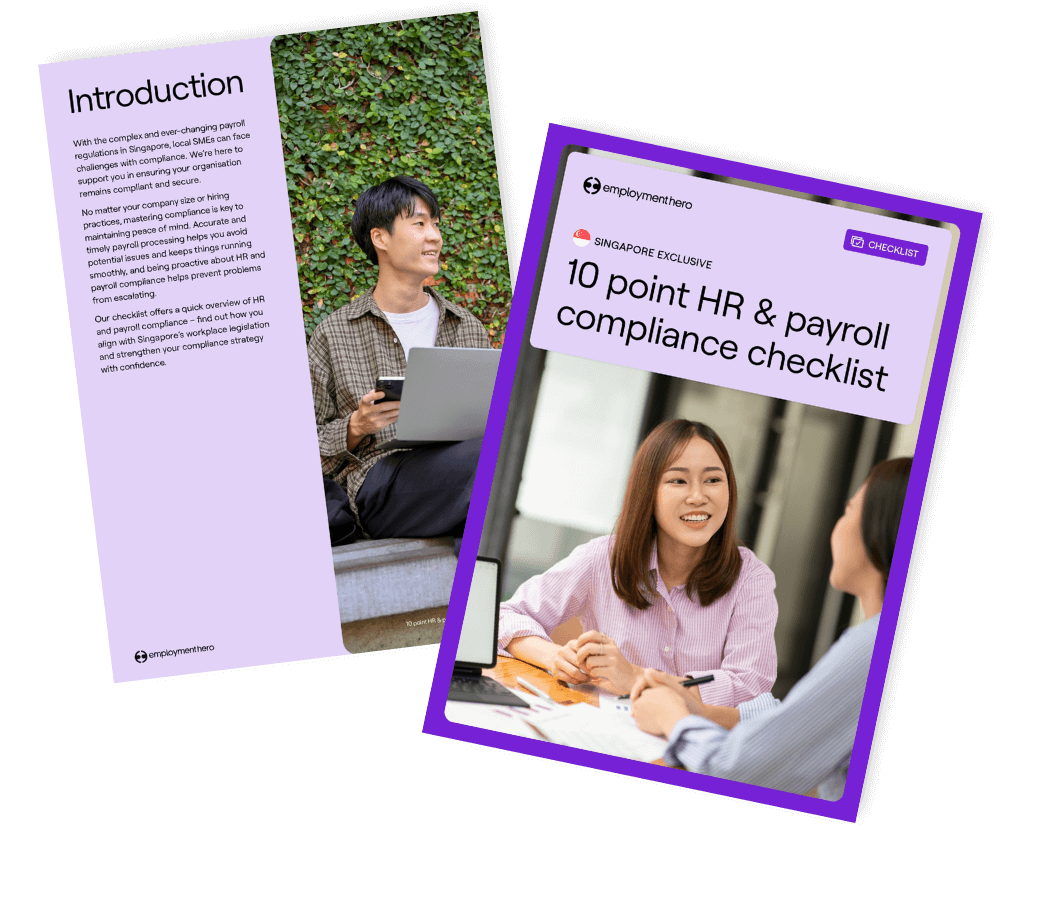Employment Law Updates in Singapore

What can you expect?
Keeping up with the latest legislative updates is essential for Singaporean businesses — but it’s always a struggle due to its complexity.
Join Employment Hero’s Sanam Ahmadzadeh Salmani, alongside Mato Kotwani and Elizabeth Wong of PD Legal, as they provide a comprehensive overview of all the latest employment law updates in Singapore. Their valuable insights will give you greater visibility into what you need to know, and how you can better prepare your business for the year ahead.
In this session, we will cover:
- Key updates from 2023/2024
-
- Parental leave for fathers
- CPF contribution salary increase
- Overtime pay for Part 4 employees
- Changes to medical insurance for foreign employees
- PWIC for health and safety of platform workers
- MAST advisory guidelines to reduce workplace fatalities
- Tripartite Guidelines on flexible workplace arrangements
- Progressive Wage Model
-
- Progressive Wage Mark and Progressive Wage Mark Plus
- Changes to COMPASS
-
- Introduction to COMPASS
- Changes in 2024 (New C5/C6 tiers for Skills Bonus and Strategic Economic Priorities Bonus)
- Introduction to anti-discrimination laws
-
- Overview of the proposed Workplace Fairness Legislation
+ Live Q&A
Disclaimer: The information in this webinar is relevant as at 28th March 2024, and has been prepared by Employment Hero Pty Ltd ABN (11 160 047 709) (Employment Hero). The views expressed herein are general information only and are provided in good faith to assist employers and their employees. The Information is based on data supplied by third parties. While such data is believed to be accurate, it has not been independently verified and no warranties are given that it is complete, accurate, up to date or fit for the purpose for which it is required. Employment Hero does not accept responsibility for any inaccuracy in such data and is not liable for any loss or damages arising either directly or indirectly as a result of reliance on, use of or inability to use any information provided in this webinar.
Additional FAQs answered by Mato:
Question |
Answer |
Could an employer terminate an employee without providing specific reasons for the termination, as generally the employment contract states either party may terminate the contract as per the contractual notice period? |
Yes. Generally, an employer can terminate employment without providing any reasons. The employer will have to provide the requisite notice period to the employee in such situations. The notice period will either be governed by the employment contract or the Employment Act. If the employer does not want the employee to serve the notice period, they can opt to pay the employee salary in lieu of notice. |
How about terminating an employee who is taking excessive sick leave? |
Please see the responses on the general rules on termination. For specific advice, you may wish to seek independent legal advice. |
How about terminating after an employee’s pregnancy and maternity leave? |
Generally, an employer cannot terminate an employee without sufficient cause during the period of her pregnancy and her maternity leave. Once these periods expire, the usual employment laws governing termination apply. Generally, an employer can terminate an employee at any time without giving any reason. |
Hi, wouldn’t a fully investigated and proven gross misconduct or unsuccessful PIP justify the termination or dismissal of a pregnant employee? |
If there is sufficient cause for terminating the employee in question, such as poor performance or gross misconduct, it is possible for an employer to terminate the employee on such grounds. If an employer terminates an employee for poor performance/gross misconduct during the period of her pregnancy, they may have to prove that the reasons were justified if challenged. It is therefore crucial for the employer to properly document the poor performance, steps taken to notify the employee of her poor performance and conduct relevant due inquiries before terminating the employee. |
if we wish to terminate someone hired on a fixed term still exercising the terms as per termination clause on the LOA without providing any reason, is it ok? Can the employee file for wrongful dismissal? |
Please see answers above on the general rules on termination. |
May I know if the employer notices that the employee has come late to work on the day of the company event purposely, is there any advice for this situation? |
You are advised to seek independent legal advice. |
Will there be any interview question template that employers can follow, so as to avoid discrimination? |
The new legislation has not come into effect yet, but I highly doubt that MOM will publish a standard form questionnaire for general use. It will be difficult to prescribe a list of ‘approved’ questions because of the variety of industries and the needs and requirements of businesses. However, I would expect MOM to publish guidelines and examples of when questions may give rise to discrimination. You may wish to obtain independent legal advice on your employment practices and interview process to ensure that your processes are in compliance with the new legislation. |
Could I put “Living in Singapore” in the copy of the job ad? To exclude any candidate from other countries as we don’t offer expat packages? |
Based on the recommendations of the Tripartite Committee, ‘Place of Residence’ is not a protected characteristic. So it is generally permissible to specify that the candidate must reside in Singapore.That being said, please note that ‘place of residence’ cannot be used as a proxy for discriminating against individuals of other nationalities. So if the true intent and purpose of requiring applicants to be residing in Singapore is to exclude applicants of other nationalities, then it may contravene the new legislation. It is important to be prepared to justify the reasons why that question is relevant. For example, if the role requires the candidate to be physically present at the office, it would be reasonable to include “living in Singapore” as one of the job requirements. |
If an employee is pregnant before their 3 months work confirmation, and the employer gives the reason of termination because the employee is not performing well, can the employee report it? |
As long as the employee has been employed for at least 3 months, she will be protected from termination for the period of her pregnancy and her maternity leave.However, if there is sufficient cause for terminating the employee in question, such as poor performance, it is possible for an employer to terminate the employee on such grounds. If an employer terminates an employee for poor performance during the period of her pregnancy, they may have to prove that the reasons were justified if challenged. It is therefore crucial for the employer to properly document the poor performance, steps taken to notify the employee of her poor performance and conduct relevant due inquiries before terminating the employee. |
Do we need to compensate employees under WICA if they are still under probation? |
WICA covers any local or foreign employee under a contract of service. It would be best to obtain independent legal advice to your specific situation as much can turn on the nature of the contract. |
With COMPASS, if the application does not gain enough points for EP due to the company ‘failing’ the diversity category, and we reject the employee essentially due to nationality — does this count as discrimination? |
It would not. The fact that the application was rejected by MOM would mean that the employer would not be able to proceed with hiring the employee because of a failure to obtain requisite approvals/passes and not on the basis that the employer has discriminated against the candidate. |
Can an employer ask a candidate to declare their mental health situation during an interview as a form of showing concern, so that if in future the employee has to take any unpaid leave or a no show due to mental health, at least the employer is aware? |
If the purpose of asking questions which are ‘protected characteristics’ is not to discriminate against such individuals but for the purposes of welfare, it may be permissible, but its important to document this and ensure that you are able to justify that this is the true purpose of asking such questions and that you are not in fact making your hiring decisions based on such protected characteristics. One important question to ask is if this is necessary during the hiring process? Or can such questions be asked after employment is confirmed if there is a need to do so for welfare purposes. |
Under the discriminatory aspect, if a staff is known to have a certain sickness after working with a company, if the company doesn’t want to renew the work pass due to potential liabilities, does that count as discrimination? |
Disability is a protected characteristic. Employers can only hire or make other employment decisions based on such protected characteristics if it is a genuine and reasonable job requirement for the employee not to have such a disability. |
Meet your hosts
Related Resources
-
 Read more: Everything You Need to Know About the Start Digital Grant Under the NCSS TechAndGO! Initiative
Read more: Everything You Need to Know About the Start Digital Grant Under the NCSS TechAndGO! InitiativeEverything You Need to Know About the Start Digital Grant Under the NCSS TechAndGO! Initiative
Discover the Start Digital Grant under NCSS’s TechAndGO! initiative.
-
 Read more: 10 point HR and payroll compliance checklist
Read more: 10 point HR and payroll compliance checklist10 point HR and payroll compliance checklist
Get peace of mind with our 10 point HR and payroll compliance checklist.












